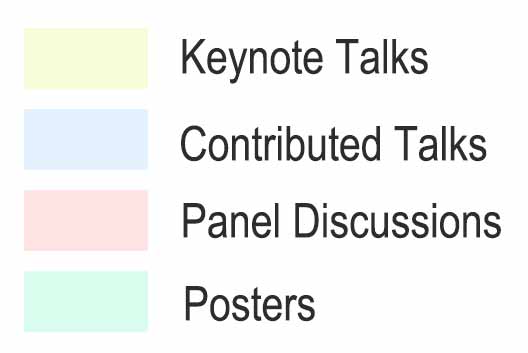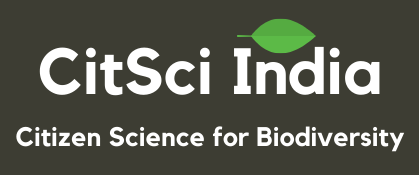CitSci India 2020 Agenda
CitSci India 2020 Conference Agenda
Note :
1. All times are in Indian Standard Time (IST).
2. This event is over. Kindly check schedule of 2021 for the current event

| Day 1: Mon, 28 Sept, 2020 | |
| 09:45-10:00 | Introduction to the Conference by Conference Steering Committee |
| 10:00 – 10:50 | Seasons of change: science and learning through observation by Geetha Ramaswami |
| 10:55 – 11:15 | Preliminary evidence for upward range shifts by Eastern Himalayan birds by Krishna Girish |
| 11:15 – 11:30 | A citizen science approach to monitor Danaine Butterfly Migrations in Southern India by PA Vinayan |
| 11:30 – 11:45 | Novel citizen science initiatives on anurans of the lateritic plateaus by Madhushri Mudke |
| 11:45 – 12:00 | Asian Waterbird Census: Fostering citizen science networks for waterbird monitoring by Dhruv Verma |
| 12:30 – 13:30 |
Poster Session Birds of India: A new citizen science platform on avian species of India. – Abhijeet Bayani Citizen Science Initiative For Biodiversity Assessment- Campus Bird Count Experience From Wayanad – Rathish R L Nest Boxes for secondary cavity nesting birds – Uday Kumar Does wealth predict neighbourhood tree diversity? Testing the Luxury Effect in Pune city, India – Anjali Umesh Bhadule Monitoring Diversity and Distribution of Odonata of Kerala – A Citizen Science Initiative – Muhamed Sherif CSIR-NCL’s Initiative towards Scientific Social Responsibility, A Closer Look. – Wafia Masih Modeling palm squirrel distributions with citizen science, social media and traditional data sources – Bishwarup Paul Citizen group leaders: Creating common platform for citizens and scientific community. – Sangunni KS Long-term Bird Monitoring Project, Goa: Lessons from Cotigao Wildlife Sanctuary. – Pronoy Baidya Beachcombing for Shorebirds: A survey of birds in migration to the Ernakulam (Kerala) Coast – Dilip K G Community Perception on Status of Betula utilis in Selected Sites of Kullu, Himachal Pradesh – Anjana Sharma What does it mean to a first time citizen scientist measuring Rainfall – Peeyush Sekhsaria People’s Perception of Slender Loris in Bengaluru – Varsha Bhaskaran KURMA Tracking Indian Turtles- A citizen science tool for turtle conservation in India – Sreeparna Dutta The scope of Citizen science WRT human-nature relational models – Kalpa Viswanadhan Deep convolutional neural networks as a tool for Indian butterfly identification – Theivaprakasham Hari Frugal Innovation Enabling Citizen Science Projects: A Case Study of Foldscope – Sonali Kadam Investigating male plumage polymorphism in the Indian paradise-flycatcher (Terpsiphone paradisi) – Rohan Menzies Encouraging Layman Engagement & Data Collection through Interactive Dragonfly Data Collection Apps – Aditya Hundekari Kidoor Bird Festival- A new initiative in engaging public towards nature conservation – Raju Stiven Crasta B |
| 13:55 – 14:15 | Putting Together the Migration Puzzle – One Resighting at a Time: A Jamnagar Case Study in Progress by Madhumita Panigrahi |
| 14:15 – 14:30 | Frogwatch in India: Current status and future directions by Gururaja KV |
| 14:30 – 14:45 | Project Pterocount — a bat citizen science initiative by Sanjay Molur |
| 14:45 – 15:00 | Key Factors for a Successful Identification of a Species in Citizen Science Projects by Yugender Subramanian |
| 18:30 – 19:30 | Scales of Participation: Citizen Science to Address Social Roots of Environmental Issues in the United States by Caren Cooper |
| Day 2: Tues, 29 Sept, 2020 | |
| 10:00-10:50 | Participatory data gathering – of whom, by whom and for whom? by Naveen Namboothiri |
| 10:55 – 11:15 | Use of citizen science data in the study and conservation of threatened endemic avifauna by Paul Pop |
| 11:15 – 11:30 | Angling for Conservation by Naren Sreenivasan |
| 11:30 – 11:45 | Harnessing public interest in wild canids and hyenas for making conservation assessments in India by Priya Singh |
| 12:25 – 12:45 | Mammals of India- a crowd-sourced online platform on Indian mammals by Vivek Ramachandran |
| 12:45 – 13:00 | Serendipitous Conservation: Using Citizen Science as a Tool to Monitor Human-primate Interactions by Ishika Ramakrishna |
| 13:00 – 13:15 | Vembanad Fish count and democratic conservation in the heavily used Vembanad Lake by Anu Radhakrishnan |
| 14:00 – 15:00 | The scope and opportunities in Citizen Science by VB Mathur, Krushnamegh Kunte, Kaberi Kargupta, Naveen Namboothiri Moderator – Pankaj Sekhsaria |
| Day 3: Wed, 30 Sept, 2020 | |
| 10:00-11:00 | Technology in Citizen Science by Prabhakar Rajagopal, Praveen J., Vijay Barve Moderator – Nandini Rajamani |
| 11:10 – 11:30 | State of India’s Birds by Ashwin Viswanathan |
| 11:30 – 11:45 | Enter the New Dragon: Dragonfly Diversity Informatics Mediated through Social Media by Yash Chaudhari |
| 11:45 – 12:00 | The eMammal project – Students collecting valuable data on mammals by Rahul Khot |
| 12:00 – 12:15 | Addressing ecological knowledge gaps for freshwater chelonians using citizen science by Anuja Mital |
| 12:30 – 13:30 |
Poster Session Bioblitz: Counting Species through Citizen Science – Vikram Singh What colour does butterfly prefer? An analysis using citizen science data – Aravind Neelavar Ananthram Influence of citizen science drives in documenting moth diversity of India – Harsha Kumar Citizens documenting Moths during Pandemic lockdown: National Moth Week India 2020 – Haneesh K M Do day-flying moth and butterfly co-occur? A citizen science case study in Dehing Patkai, Assam. – Subhasish Arandhara HiveWatch: a citizen science project to monitor A. dorsata colonies in Indian cities – Rajath S Role of large, open for all, birdwatching events; Learnings from Onam Bird Counts (2014-2019) – Sreekumar E R How climate change is affecting lives of local communities in the Himalayas – Simran Tomar Seasonality of Spot-billed Pelicans in Bangalore – Prashanth M.B. Pictionary Assisted Monitoring of Biodiversity and Conservation Efforts Using Citizen Scientists. – Manan Goyal Conservation of the heronries of Kerala through people’s participation – Roshnath Ramesh Preliminary results of the first City bird Atlas of Tamil Nadu – Coimbatore City Bird Atlas – Dr.T.Arulvelan, Selvaganesh K Hoot: Owl Call Recognition using Deep Learning – Abhishek Wahane Biodiversity of West Bengal: a citizen science initiative to understand biodiversity of the state – Sagar Adhurya Monitoring water quality of ponds in the Ganges-Brahmaputra-Meghna delta using citizen science – Lucy Roberts National Mothweek Kerala – Unnikrishnan.MP Preliminary findings and observations of Pune Bird Atlas project – Siddharth Biniwale, Kedar Chaphekar Looking into citizen science as a solution for conservation of Smooth-coated otters. – Krunal Trivedi A Critical Review on Technology-mediated citizen science – Suraj Kumar Dey Scientific contributions and learning experiences of citizen volunteers with a small cat project in Sanjay Gandhi National Park, Mumbai – Shomita Mukherjee Importance for documentation of Biodiversity – Neel Gadikar Kasaragod Bird Atlas – Maxim Rodrigues K Citizen Science and Disease Ecology – Nikeshraj. N Story of Lockdown-Backyard-Bioblitz-Kerala – Manoj Karingamadathil Urban Wildlife protection and development as a citizen movement for the sustainability of a city – Colonel.Navaz Shariff LivelyWaters! a freshwater biodiversity citizen science initiative – Priyanka Iyer Our River, Our Life: River Monitoring and Citizen Science – Neethi Mahesh |
| 13:55 – 14:15 | The Use of Atlas Data for Bird-friendly Urban Planning by Tarun Menon |
| 14:15 – 14:30 | LimKnow : A citizen science app for lake management by Sudeshna Gupta |
| 14:30 – 14:45 | Did pandemic improve availability of biodiversity occurrence data in India by Vijay Barve |
| 14:45 – 15:00 | My Introduction to IBP and the subsequent pedagogical and environmental benefits from it by V. Arun |
| Day 4: Thur, 1 Oct, 2020 | |
| 10:00-10:50 | Bazookas, Mobile Apps and the Agora: Citizen Science and prospects for a more Public Science. by Naveen Thayyil |
| 10:55 – 11:15 | Makunda Nature Club by Rejoice Gassah |
| 11:15 – 11:30 | Tamiraparani Waterbird Count: A Citizen Science Initiative in South Tamil Nadu by M. Mathivanan |
| 11:30 – 11:45 | Odonata of India: Studying dragonflies and damselflies of India through citizen science by Shantanu Joshi |
| 11:45 – 12:00 | Perceptions of SCUBA divers on coral reef health – applications in citizen science by Suneha Jagannathan |
| 12:25 – 12:45 | Early encouraging trends from engagement with citizen groups in the state of Madhya Pradesh, India by Anup Prakash |
| 12:45 – 13:00 | Charting Biodiversity in a Transforming Urban Seascape – A Citizen-driven Approach by Abhishek Jamalabad |
| 13:00 – 13:15 | Lessons from Snake Sense, a citizen science and education project on snake conservation from Kerala by Peroth Balakrishnan |
| 13:15 – 13:30 | Learning with our eyes wide open by Madhavan A.P. |
| 14:00 – 15:00 | Highlighting the citizen in ‘citizen science’ by Vidhya Swaminathan, Anubhav Agarwal, PV Prabhakaran, Siddharth Biniwale Moderator – N.S. Prashanth |
